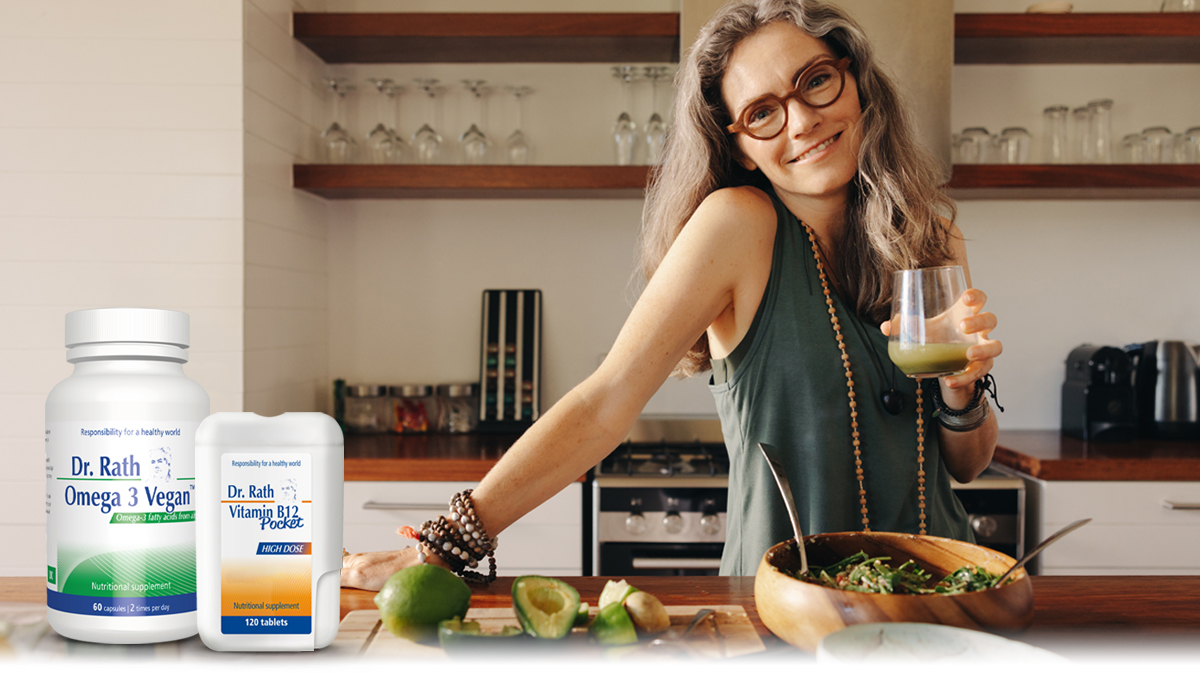
Give vegan a try!
For over 10 years, January has been known as #Veganuary. It’s not just for veggie lovers—everyone can join the celebration of plant-based eating. We’re on board too, supporting you with a range of vegan-friendly formulas that benefit vegans, flexitarians, and even committed omnivores. This week, we’re spotlighting two of these products in detail.
Debunking the Myth: Is vitamin B12 deficiency only a vegan issue?
This isn’t entirely accurate. Vitamin B12 (cobalamin) is exclusively produced by beneficial microorganisms naturally found in soil or on unwashed organic vegetables. Wild animals obtain their B12 naturally, for instance, by foraging in the ground. In contrast, livestock in industrial farming typically receive B12 through feed supplements. Significant amounts of this vitamin are primarily found in animal organs like liver and kidneys—so ask yourself, when was the last time you ate offal?
Various factors can deplete vitamin B12 levels, including stress, environmental pollutants, smoking, alcohol consumption, and certain medications. To prevent a deficiency, supplementing with vitamin B12 alongside a balanced diet is recommended. An ideal choice is a combination of methylcobalamin and adenosylcobalamin, the two bioactive forms of B12. This is a great option for anyone looking to maintain healthy B12 levels.
Find your balance with omega-3
Our diet tends to be too high in pro-inflammatory omega-6 fatty acids, which are commonly found in animal-based products like meat and dairy. In contrast, omega-3-rich foods are consumed less frequently. Good sources of omega-3 include fatty fish, sushi, sprouts, tofu, flaxseed oil, and algae oil—foods often associated with Asian cuisine. While omega-6 is necessary for the body, it’s crucial to maintain a balanced omega-3 to omega-6 ratio. An excess of omega-6 can interfere with the anti-inflammatory effects of omega-3, contributing to vasoconstriction and inflammation. To maintain optimal health, it's important to monitor your omega-3 balance. Our fish-free alternative provides these essential fatty acids while also supporting sustainable fish stocks.
Debunking the Myth: Is vitamin B12 deficiency only a vegan issue?
This isn’t entirely accurate. Vitamin B12 (cobalamin) is exclusively produced by beneficial microorganisms naturally found in soil or on unwashed organic vegetables. Wild animals obtain their B12 naturally, for instance, by foraging in the ground. In contrast, livestock in industrial farming typically receive B12 through feed supplements. Significant amounts of this vitamin are primarily found in animal organs like liver and kidneys—so ask yourself, when was the last time you ate offal?
Various factors can deplete vitamin B12 levels, including stress, environmental pollutants, smoking, alcohol consumption, and certain medications. To prevent a deficiency, supplementing with vitamin B12 alongside a balanced diet is recommended. An ideal choice is a combination of methylcobalamin and adenosylcobalamin, the two bioactive forms of B12. This is a great option for anyone looking to maintain healthy B12 levels.
Find your balance with omega-3
Our diet tends to be too high in pro-inflammatory omega-6 fatty acids, which are commonly found in animal-based products like meat and dairy. In contrast, omega-3-rich foods are consumed less frequently. Good sources of omega-3 include fatty fish, sushi, sprouts, tofu, flaxseed oil, and algae oil—foods often associated with Asian cuisine. While omega-6 is necessary for the body, it’s crucial to maintain a balanced omega-3 to omega-6 ratio. An excess of omega-6 can interfere with the anti-inflammatory effects of omega-3, contributing to vasoconstriction and inflammation. To maintain optimal health, it's important to monitor your omega-3 balance. Our fish-free alternative provides these essential fatty acids while also supporting sustainable fish stocks.
Dr. Rath Omega 3 Vegan™
Item No.
028
€ 28,90
Order
Dr. Rath Vitamin B12 Pocket
Item No.
040
€ 21,90
Order

 Deutsch
Deutsch
 Español
Español
 Français
Français
 Italiano
Italiano
 Polski
Polski


